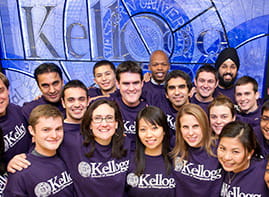McDonald’s CEO Jim Skinner shares the keys to global brand-building at Chicago Centennial event
2/25/2009 - Today, McDonald’s is one of the most successful companies in the world. But there was a time when the company’s focus on growing bigger — instead of better — hurt profits and damaged the global brand.
The Oak Brook, Ill.-based restaurant chain got back on track quickly under the leadership of Chief Executive Jim Skinner, returning its focus to building a strong global brand and regaining respect and admiration from customers and business leaders.
Skinner shared the business principles that led McDonald’s turnaround at the Kellogg School Global Insight luncheon Feb. 20 at the Chicago Hilton & Towers Hotel. More than 700 people attended the event, one of a series of international Centennial conferences marking the Kellogg School’s 100th year.
Skinner elaborated on the practices that helped sculpt the McDonald’s global brand:
- Collaboration. Skinner said that the company had to focus on key strategies and make sure that McDonald employees could rally around those principles.
- Be customer-centric. The company has to listen to what its customers want, rather than tell customers what they want, Skinner said. And what customers desire from McDonald’s is a better variety of choice at a predictable value.
- Ability to be locally relevant. Taste, trends and needs are so diverse in every country, that McDonald’s can’t use the same business model for every location, Skinner said. For McDonald’s, that meant adapting to the local customs and traditions in its 31,000-plus restaurants in more than 100 countries. Examples include closing McDonald’s five times a day for prayer in Saudi Arabia or serving shrimp entrees in Japan. Skinner noted that the chain’s most successful market in Europe has been France, thanks to McDonald’s adaptation efforts in that country. “If the French love us, who can hate us?” Skinner joked. “We’re doing something right.”
- Be a good corporate citizen. Skinner said one of the company’s duties is to make its massive environmental footprint a positive one by reducing energy output, building sustainable fisheries and working with supply chain vendors to establish healthy environmental operations.
- Talent management and leadership development. McDonald’s puts high-potential employees through a leadership institute, providing training and support for their next career steps. Skinner said diversity is an important value at the company, and that the best ideas result from a diverse team. “Real leaders are ones who get it done, deliver and execute,” Skinner said.
Kellogg School Dean Dipak Jain also spoke during the event. He discussed the history and expansion of Kellogg’s global educational outreach, which includes Executive MBA programs in China, Canada, Germany and Israel.
“If students do not come to you, you need to come to them,” Jain said. “We are in the business of shaping talent wherever they are.”
Beyond an MBA degree, Jain said the Kellogg School provides students with experiences that develop the ability to anticipate, the courage to deal with ambiguity, and the adaptability to perform in cross-cultural situations. He added that students also are instilled with social responsibility, ensuring that they think beyond business and personal success.
“We don’t want to be just the best business school in the world, we want to be the best business school for the world,” Jain said.
The Chicago event was part of the Kellogg School’s year-long Centennial celebration, highlighting a century of research and teaching. In January, Kellogg hosted its first Centennial conference in Miami, focusing on customer-centric innovation. A second conference was held in February in Zurich focusing on the threats and opportunities for business leaders in the global environment.
Subsequent conferences will be held March 10 and 11 in New York, focusing on the future of capital markets, and March 25 and 26 in Shanghai, discussing the architecture for corporate brands.






